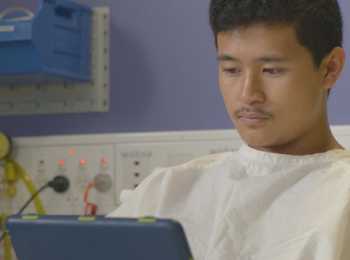Contents
Part 3
School, work, and other stuff
School
For some young people, school might be a welcome relief. It can be a place where you can go and see your friends, do normal things and forget about cancer for a while.
But for others, going to school when your parent is sick or dying can cause a lot of stress.
When you’re back and forth to the hospital, taking on more responsibilities around the house and helping to look after your parent, you might find it hard to find the time or energy for school.
It can also be really hard to concentrate when everything’s so hectic. You may miss a lot of classes, slacken off on your homework and start to fall a bit behind.
You might worry about being away from your mum or dad and find that school just doesn’t seem that important right now.

"I avoided school because I didn’t really care about it and my mind was elsewhere. I was facing horrible stress,
my hair was falling out and I had terrible dandruff, I was breaking out in heaps of pimples and I gained a lot of weight. This did not help me to want to go to school."Laura
“At school I wasn’t trying, I didn’t care, didn’t hand in any work.
It’s important for teachers to know. It takes the pressure off. They do understand and will give you more time.”Peta
“My teacher told me that if I felt that I needed to spend the day with Dad not to feel bad about missing school. They said it was easy to catch up on school work but not to make new memories.”
Amy
Tips to stay afloat:
- Let your teachers know what’s happening at home. How much you decide to tell them is up to you. But you will probably find that they do understand and will try to make things a bit easier for you. They might be able to give you more time for your assignments or let you have time off when you need it.
- Try to get as much done at school as you can, so you don’t have to bring work home.
"The workload seemed a bit heavy at the time, but the teachers were extremely sympathetic and were willing to be lenient when I needed it."
Megan
- Try not to stress about your school work. It can wait, if necessary, until things settle down again.
- Talk to your teachers or a counsellor if you’re being bullied or your marks are starting to suffer.
"My teachers were very understanding because I was able to openly let them know what was going on. Sitting my final year exams I got some allowance for my circumstances and got more lenient marking because I had lost sleep and focus due to living with and worrying over my Dad."
Lizzie

Work
What you tell your boss or work mates about your parent’s cancer is completely up to you. There is no law that says they need to know. However, you might find that if you do they will be supportive and understanding, especially if you have to take time off or are just having a bad day.
Just before and after your parent dies you’ll probably want quite a bit of time off. You have the right to take time off work, but you should check with your manager about exactly how much.
Most people know you can take paid sick leave (unless you are a casual). But you may not know that you can also take paid carer’s leave if you have to look after a family member who is sick, or paid compassionate leave if a family member dies, or is about to die. The Australian government website, www.fairwork.gov.au can tell you all about your rights at work.
Getting help and support
There are lots of organisations, government agencies and charities out there offering things like financial assistance, carer support, student services, legal advice and medical information. Almost all of these services are FREE and they WANT to help you. Don’t be afraid to use them, that’s what they’re there for.
See the contacts listed in the back of this book to find them.
Top Tips
Check out the website, www.fairwork.gov.au to learn about your rights at work.
Friends
"I was lucky as a lot of my friends are like extended family as I have known them since I was little and they felt like they were going through it too. We laughed together, we cried together and when I was feeling down, they would boost me back up again."
Samantha
Some friends are great at being there for you and holding you up when your feelings come and hit you like a bus.
But sometimes, friends don’t really know how to handle what is going on. They might stop calling you or inviting you out and it can feel like they’re not there for you when you need them.
"I couldn’t talk about it. You bring it up once and they say “I’m sorry” and that’s it. It was too awkward. I felt I would be there for them if something happened but they weren’t there for me."
Amar
“True friends are the ones who don’t bail when it’s getting hard.”
Peta
You find out who your true friends are.
Ignoring it is not good enough for your best friend.Erin

A lot of friends don’t really understand the whole cancer thing and don’t know what it’s like to have a parent who is sick or dying. But even when you know this, you might feel really hurt and let down when your friends aren’t very supportive.
You might also find that you have less in common with your friends now. You are going through some massive changes in your life and you might find you are not as interested in what your friends talk about anymore. You might feel a bit jealous that your friends still have “normal” lives and think they sound a bit trivial and ungrateful sometimes.
“My school friends just p*ssed me off.
They’d be like, ‘Oh my mum made me such a crap sandwich today’.”Steph
But if your friends are staying away, it doesn’t necessarily mean they don’t care. They might be trying to avoid upsetting you.
Here are some things to think about…
- Friends might be worried about saying the wrong thing, so they say nothing.
- They don’t know if it’s OK to mention cancer or your parent. You might have to start the ball rolling.
- They are worried about imposing on your family time so are shy to call or visit.
- They think their lives are boring and unimportant compared to yours and don’t know if they should talk about normal things.
- This is new territory for your friends. Before you had this experience you might have acted the same way.
- They won’t say things that deliberately upset you. Sometimes they might say things that annoy you or make you angry. But try not to be offended, they just don’t understand.
- Friends may change. You might find that you lose some friendship along the way as you and your friends start to have different perspectives on life. But this may have happened anyway, cancer or no cancer.
“Some friends killed me with kindness and other friends were like a brick wall. It’s not fair I can’t even bring it up with my friends.” Andrew
Staying in touch
Try to stay in touch with your friends. Let them know that even if you can’t always go out, you still like to be invited to things. It’s important to have some fun and take your mind off things sometimes.
Be as open as you can with your friends. If you don’t feel like telling the same story a hundred times, you could just keep everyone updated on what’s going on with your Mum or Dad through Facebook or MySpace or group emails or texts.

Making new friends
So many other people say that the best kind of support comes from meeting and talking to other young people who have ‘been there and done that’ and really know what it’s like.
There are support groups out there – like Canteen – that bring together people your age who also have a parent with cancer, or who has died from cancer.
It can really help to connect with people who are going through the same thing and having similar feelings to yours. You can compare battle scars and give each other tips, or just hang out and have a break from it all. It can be a big relief to realise you are not the only young person who has a parent with cancer – and to hear how other people deal. Canteen organises free camps and day activities that you can go on to get support and just have fun.
You can also read real-life stories from other young people, share your own, or chat to ‘experts’ on websites like www.nowwhat.org.au or www.youngcarers.net.au.
"I had become a bit isolated, so coming into Canteen was a good help, having the opportunity to get away from things and talk about it.
To see other young people whose parents had died and see how normal they still seemed."
Lizzie
Tips for friends
Your friends probably really want to help you but don’t know how. Maybe you could give them some suggestions, like….
- Just give me a hug.
- Just listen and be there for me.
- Let me cry. You can cry with me.
- Let me rant and vent.
- Talk about my parent. Use their name. They exist and they are important to me.
- Don’t focus on cancer, but don’t ignore it either.
- We can still laugh and have fun. I need to be distracted sometimes.
- Invite me over or to the movies. If I say no, ask me again another time.
- Treat me like normal. I’m still the same person.
- Ask me how I’m doing, not just how my parent is doing.
- Write me a card. Not just a generic one, but one that says what you really want to say.
- Check up with me regularly. Don’t smother me, but just be there.
- I know it’s hard to talk about, but don’t abandon me just cos it’s easier.
- You can help me by ................................................................................................................................ .......................................................................................................................................................................
The most helpful things people said was not, “Call me if you need me”. It was nice, but I didn’t want to inconvenience anyone who had family and jobs of their own.
The best thing was people offering specifc things at specifc times; “Shall I come over this Saturday and help clean up a little?” or “Do you want me to cook dinner for you this Wednesday?””
Lizzie

Dumb things people say
When you have a parent who is really sick or dying, you might find people say the most unhelpful things.
Some people feel the need to say something, even if they don’t have the right words to express themselves. Some of the old clichés might hurt, some of them might make you angry.
Here are some of our favourites (not!) and the answers that you probably wish you could shout.
“I know how you feel” No, you don’t!
You haven’t been through this – and you’re not me!
“They can do amazing things these days, he’ll be fine”
You don’t know that.
“I’m so sorry”
But you didn’t do anything!
“I understand, my dog died last year.”
It’s so not the same!
“Stay positive. My neighbour was given a week to live and she was still here ffty years later.”
Good for them, I only care about my mum/dad right now! “Life goes on” Yes, life may go on, but for me losing my mum/ dad is not something I’m going to get over!
“It could be worse. Think of the children in Third World countries that have to go out and work 15 hours a day.”
But my mum is dying here! I deserve to complain and feel bad sometimes.
“You are so inspiring.”
I’m barely coping. Do you expect me to be able to save the world now or something?
“It’s God’s will.”
How do you know I believe in God? And why would God want them to die, anyway?
“Everyone dies. Get over it.”
So you’d be over it by now if it was your parent? Yeah right!
“It will be over soon and you can start a new chapter.”
So I should just forget my parent and move on?
“You’re lucky you had them for this long at least.”
I would trade anything to have more years. Is that supposed to make me feel better?
“You’ll see them again in a special place.”
You’re assuming I believe in heaven.
You probably don’t want people to look at you with puppy dog eyes and say, “It’s going to be OK”. But you don’t want people to tip-toe around and ignore it’s happening either.

What can you do?
- You could ignore it.
- Say, “Hey, my mum/dad has cancer. How would you feel if it was your mum/dad?”
- Try to remember they probably mean well and are just trying to help. But no one teaches this stuff. Most people don’t have much experience talking about cancer or dying. Their words might not quite come out right, but they don’t mean to cause offence.
- If people are being mean on purpose, tell someone about it. A teacher or counsellor could help you if you are being bullied.
- Give them the “Just one thing” card at the back of this book to give them an idea about how to help you.
The sad truth is, there is really nothing anyone can say that will make this better, no magic words that will take away the pain.
Talking about it
“If you’re upset, you can tell someone.
You don’t have to be strong. It’s not your job to hold the family together.”
Eloise
It can be really hard to let people know you are struggling. You might not be able to find the right words, or feel embarrassed or scared of looking like a whinger or getting upset.
But heaps of young people say that talking things out can be a big relief. It can help to put things into perspective and sort things out in your head. It can also help you feel less alone.
Your first step in getting support is admitting that you need it. The second step is finding the right person.
The right support person will be easy to talk to. They will listen and not judge or make you feel ashamed for anything you are feeling.
So where do you find someone like that? It can feel like there are people all around you, but no one who really gets it.
Family
Everyone in your family is going through this too. If you don’t feel you can talk to your sick parent, you may be able to turn to your other parent or your brothers or sisters. Your aunts, uncles, grandparents and cousins can also offer great support. They are probably sharing many of your fears and you can make decisions together.
Other people
You might be lucky and have some great friends who know how to provide you the support you need. But if they’re not great at being there for you, you might be able to turn to a teacher at school and let them know what’s bothering you. Community and religious leaders, like priests, pastors, rabbis, imams or elders are also experienced in supporting people and offering advice.
"Even if you are feeling alone, there is always someone there. You just have to find that special person that you feel comfortable sharing with. It may take time to find them but if you are patient it will be worthwhile."
Melissa
Your local doctor
Doctors don’t only treat physical problems, but can also help in offering you support. They might have also known your family for a while and understand what’s happening for you. If you are over 14, you don’t need your parent’s permission to see a doctor.
Palliative care team
If your parent is receiving palliative care, the team is there to provide emotional and practical support for the family and carers, too. Don’t be afraid to talk to them about anything that is bothering you. They will be very happy to answer any questions you have about all kinds of stuff, not just medical questions.
Counsellor or social worker
These are professionals who have been trained to give emotional and practical support to people who are going through tough times. They can help you find solutions to problems and find ways to cope with the different parts of your life. They can also help your family to make decisions together if you are not so great at communicating right now.
The Australian organisation, Canteen runs a free counselling service especially for young people aged 12-24 who have a parent who has cancer, or has died from cancer. Email [email protected] or call 1800 CANTEEN for more information.
You can ask them about anything that you are worried or wondering about and they will keep it confidential. Lots of counsellors and social workers have particular experience working with families living through cancer, so they will really understand what you’re going through. If you prefer, you can often talk to counsellors on the phone or by email, too.
Other places you can find a counsellor
- There may be a counsellor at school or uni you can go to.
- Ask your local doctor to organise one for you.
- Your parent’s hospital might offer counselling services to family members. Ask the nurses or palliative care team about this.
- Look up “Community Health Services” or “Family Counselling” in the Yellow Pages to find a service near you.
- The Cancer Council Helpline can also provide support and information. Call 13 11 20.
Usually you need to make an appointment to see a counsellor. If you need to talk to someone right now, you can call Kids Helpline on 1800 55 1800 or Lifeline on 13 11 14. It might take you a couple of tries to find the right counsellor for you. If you don’t feel comfortable with your counsellor, or if you feel that they are not listening to you, try a different one. You will eventually find someone that you click with.
"About counsellors; go to a couple, try before you buy, shop around and find one that suits you."
Andrew

“It helps to talk. You don’t have to keep it all inside.
People care, they want to listen. If you don’t have anyone like that, there are people out there, like Canteen.”
Eloise
Support groups
There are organisations that bring together people with similar experiences so you can talk about things with people who really, truly understand – or just take some time to chill out and have fun.
Sometimes you talk about cancer in these groups and share stories and tips for coping with each other and with professionals. Other times you just hang out and make new friends with people who get what you’re going through.
Canteen is one organisation that offers support to people who have a parent living with cancer, or who has died from cancer. There are other organisations listed in the back of this book.
Your church or local community might have other youth groups that you can join.
Online support
The are lots of on-line forums, blogs and support groups that can bring together people in similar situations. It can be really helpful to read other people’s real-life stories and realise that you are not alone in what you are feeling. It can also make things easier to open up when you can be anonymous.
The website www.nowwhat. org.au brings together young people in Australia who have a family member with cancer, or have cancer themselves. You can read heaps of real stories, join forums and access information written specifically for people like you.
"Showing emotion is not necessarily a weakness. You can think of it as a strength."
Eloise
How Your Parent Feels
Being told that they are not going to recover from their cancer is probably the hardest and most scary thing your parent will ever hear. Like you, it’s likely they are feeling all kinds of things that can change from day to day.
They might be feeling lonely, angry or desperately sad. They may be shocked or in disbelief and very afraid. They may be worried about being a burden or about what will happen to your family after they die.
Your mum or dad might not be sure how to talk to you or be trying to protect you from upsetting information. You might also have lots of questions but don’t think you can bring them up. It’s OK to figure this out together, and to be upset together. Just like you, your parent probably never expected this could happen to them and won’t always know the right things to say or do. They may not get it right all the time, but they are doing their best in a really difficult situation.
Try to be as open and honest as you can with your parent. This may not be easy, particularly if you have never gotten on that well and are not used to talking about your personal feelings. But it’s never too late to try and tell them how you feel - and you will probably be glad you did in the future.
“When Dad was so sick, I was scared to upset him. I didn’t want to go up and hold his hand cos I knew I’d cry and I didn’t want to make him cry…
Even though it’s scary and hard, after that person dies you can’t go back… I do try and tell myself that he knew that I loved him and how important he was to me. I’m sure he’d have known it, but I’m sure he would have liked to hear it.”
Eloise
"It was like there was an elephant in the room but no one would talk about it! We all knew it was coming but what was there to say?"
Melissa

They are still them
It may be true that your parent’s illness is going to shorten their life. But they do not stop living until the last breath. While they are still here, treat them as you always have. They are still your parent.
It’s OK to still argue with them sometimes. Or to joke around and talk about normal things. It can really help them to feel included in what’s going on and like they are still part of the world.
Talking about death It can be really, really hard to talk about dying. You may have lots of questions, or you may not want to talk about it at all. Your parents might also find it difficult to talk about. If you and your family can, it can be helpful to talk about things like where your parent would prefer to die, who they would like to be around them when it happens, funeral arrangements or things that might change after they die.
Talking about these things does not mean that you want your parent to die or that you have given up hope. Your palliative care team can talk with you as a family (or individually) about these things if you like.
Your parent might actually be relieved that you brought the topic up. They might even feel comforted to know that you know the end is coming.
“Accept every moment for what it is,
don’t focus on “I wish I could do this” or “I wish this was different”.
Eloise
“Sometimes we’d just pop on a movie and all sit in silence.
Just be together, you don’t have to say anything.”
Amrita
Follow their lead
Your parent might not always feel like talking. In the later stages of their illness, they might be tired, or trying to put on a brave face, or overwhelmed by feelings of sadness. Their illness or medication may have caused changes in their thinking or behaviour. Everyone deals with stuff in different ways and your parent might cope by withdrawing from family activities, or becoming argumentative or demanding. Try not to take this personally.
Just being with them and giving a hug or holding hands is enough, they will know how you feel.
If they feel like talking, listen. If they want to talk about dying, don’t correct them and say things like, “No, you’re not. Don’t talk like that”. It can be painfully hard to talk about, but it’s OK to be upset and afraid together. You could try, instead to say something like, “I know this hard. But it would help me to talk about this”.
There will be good days and bad days
There will be some days when your parent is too tired or sick to talk. They may become impatient or testy or seem withdrawn or distant. This might make you feel hurt, disappointed or worried.
If your parent is feeling too ill to spend time with you, this doesn’t mean that he or she doesn’t want to. There may be other ways you can show that you care – like writing notes or bringing them small gifts, or just sitting there.
If your parent is in hospital, it’s OK to visit. It might be less scary if you ask a nurse or someone in your family beforehand how they are going and what you should expect. Most young people find that even though it is really hard to see your mum or dad when they are weak and sick, you will value all the time you have spent with them later.
"He wasn’t conscious for the last few days. It was about just being there and talking to him even though he didn’t respond."
Peta
"I wish I’d known before that I should spend as much time as possible with Dad.
Every second with him was better than being anywhere else, even when he was sleeping."
Sarah
Saying goodbye
How do you possibly think about saying goodbye to your mum or dad?? The truth is, you will never be ready for a life without them.
"One of the hardest parts was imagining life without Dad. The thought was just too painful, thinking of all the things Dad was going to miss out on seeing me do. At the time all I wanted was for him to see me dressed up and going to my Year 10 Formal."
Melissa

How do you know when it’s time to say goodbye?
No one can tell you exactly when your parent is going to die. So, how do you prepare to say goodbye?
It might seem a bit embarrassing to have big deep and meaningfuls and tell your mum or dad all your deepest secrets, when they might still be around for months or years. Or you might be worried that they will think you have lost hope if you start talking about life without them.
But would it really be so bad for your parent to know now how much you love them?
It often helps us feel more ready if we find ways to say lots of little goodbyes, bit by bit, in a lot of different ways.
“They don’t have to be in the palliative stage, you can have the conversation just in case. It wouldn’t hurt to have this now”
Erin
In the words of other young people who have been through this:
Don’t let things go unsaid.
"Knowing what I do now, I would try not to hold back. If I want to tell someone how I feel then I would tell them." Eloise
Not every family finds it easy to talk openly with each other. This doesn’t necessarily change when someone is dying.
Here are some thoughts to get you started:
- Thank you for…
- I’m sorry that…
- I love you because …
- I feel proud when you …
- I forgive you for…
- I hope that…
- If only…
- What scares me the most is…
- A favourite memory I have is…
- You make me laugh when…
- I’ll miss you.
- I know that this is really hard for you too.
- I will be OK. I will get through this somehow.
- Do you have any advice for me in the future?
- What are your hopes and dreams for me?
“Let them know how much they mean to you every chance you get as you don’t know when it will be the last.”
Melissa
“You feel a bit awkward with the whole “I love you” convo, but you might appreciate it later.”
Mark
“I wish I’d asked her what were her dreams were. I didn’t think at the time it was such a nice subject to bring up.”
Steph
Don’t worry if you didn’t say it all
It is daunting and scary to try and remember everything you think you have ever wanted to tell them before they die. Don’t be scared to forget things, or fail to remember a specific memory you wanted to share one last time. The truth is, they know how you feel, how much you love them, how much you will always love them.
You might find it hard to be around your parent as they approach the end of their life. You are not just a visitor in this experience. It can be really draining to be around them when they are really sick and you might feel like you need a bit more space. You don’t need to feel bad about that. That’s normal too.
“The last month was the best –
it had already sunk in and we saw a lot of our family. We had a “Daddy Day” each week and got a day off school. There were some good times in the end stages.”
Erin
Just hang out together
If you can, make the most of the time you have with your parent, you will probably really cherish this time. Try to think of things you can still do together. You might be able to play a board game, watch DVDs, read the paper or a book to them, or get them to help you with your homework.
Make some one-on-one time
There might be lots of people around helping and wanting to spend time with your parent. But it’s alright to demand a bit of alone time with your mum or dad. You will value this time in the future.


















